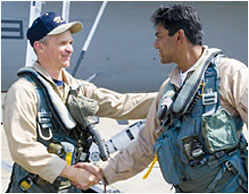
Vishnudeep Som’s documentary series include The Jet Set, in which he flew on several fighter jets from across the world. Som (right) is pictured after a sortie on a U.S. Navy F/A-18 Super Hornet.
When the Indian Supreme Court ruled in 1995 that the government’s monopoly over broadcasting was unconstitutional, the stage was set for India to develop into one of the world’s largest and most competitive television environments. Vishnudeep Som arrived on the fledging broadcast scene in 1996, and now, only 12 years into the business, is considered a veteran independent news journalist.
“Television journalism was in its infancy when I returned to India. It seemed an interesting field and my background in history and political science and my master’s in communication seemed suitable,” says Som, BAHons/95, MA/96, an associate editor and news anchor at New Delhi Television, India’s first and largest private news network. “I’ve had a first-hand look at the dramatic transformation of the electronic-media space in India.”
Som anchors the news at nine and other programs, including a new prime-time audience-based show, India’s Future. His more than 7,000 hours of live anchoring experience is backed by extensive field reporting. The Times of India describes Som as an expert in conflicts: he’s reported extensively from Kargil during the 1999 India-Pakistan war, from Kabul, Afghanistan, before the fall of the Taliban and during the war, and from Iraq. He was the first reporter to reach the site of the 1996 Charkhi Dadri mid-air collision of passenger planes and in 2004 reported on the Indian Ocean tsunami from the Andaman and Nicobar islands in the Bay of Bengal.
“I have always had an interest in covering conflict and disaster situations. The reward is the rush of anchoring breaking news and the awesome responsibility of being sensitive when reporting conflict,” Som says. “My thesis advisor Eileen Saunders gave me the confidence to tackle complex socio-political and cultural themes with an element of confidence and somehow that has translated into an ability to not get overwhelmed by real-life situations. I try to approach journalism the same way I tackled research essays at Carleton…by recognizing the expanse and scope of a particular subject, focusing on the relevant bits, and recognizing that often there is no one correct answer.”
Next …